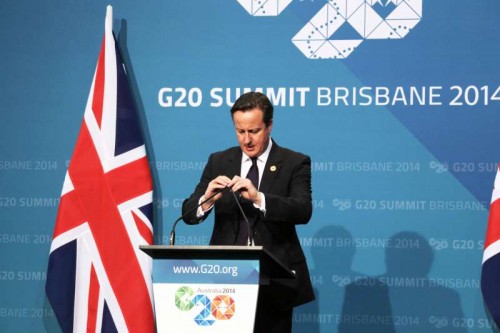
“Red warning lights” are once again flashing over the state of the global economy, the prime minister has said.
Speaking after the G20 meeting of world leaders, David Cameron said a “dangerous backdrop of instability” threatened Britain’s recovery, and “we should stick to our long-term plan” reported BBC.
In the Guardian article, he warned of the impact from conflicts, low growth and a eurozone “on the brink” of recession.
Labour said Britain’s economic recovery was still not being felt at home.
But writing in the newspaper, Mr Cameron said “red warning lights are once again flashing on the dashboard of the global economy” – six years on from the crash that “brought the world to its knees”.
He said: “The eurozone is teetering on the brink of a possible third recession, with high unemployment, falling growth and the real risk of falling prices too.
“Emerging markets, which were the driver of growth in the early stages of the recovery, are now slowing down.”
David Cameron calls it “pitch rolling” – preparing the ground for a big match.
The prime minister has just got his heaviest roller out to prepare for not one but two huge political matches – Thursday’s Rochester by-election and the Autumn Statement in less than three weeks time…
And he said the Ebola epidemic, conflict in the Middle East and Russia’s illegal actions in Ukraine were all adding to a “dangerous backdrop of instability and uncertainty”.
The warning comes after Mr Cameron pushed for a free trade deal between the European Union and the US at the G20 summit in Australia.
The prime minister will make a statement to Parliament at 15:30 GMT about the summit and the state of the global economy.
Data released on Monday showed Japan is in recession after its economy contracted in two consecutive quarters.
Italy returned to recession last week after its economy shrunk 0.1% in the third quarter while Germany narrowly avoided the same fate with growth of just 0.1% between July and September.